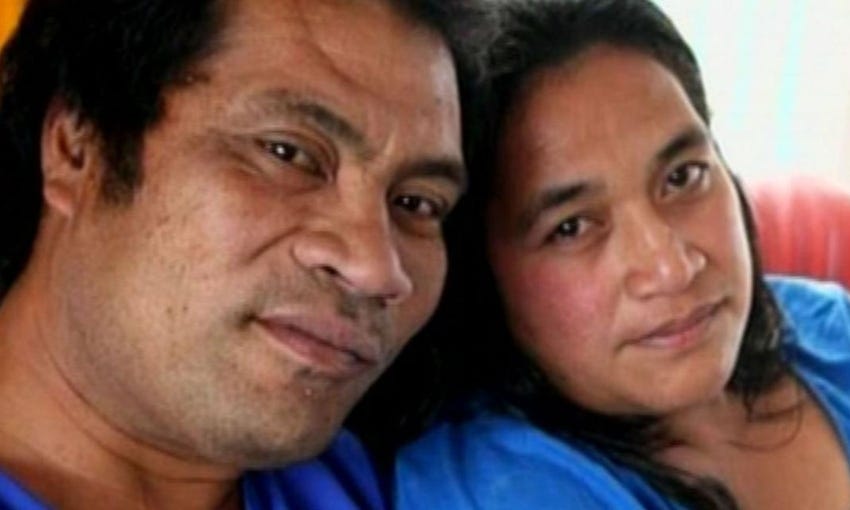What the UN climate refugee ruling means
And what it means for the man at the middle of it all

Good morning and welcome to The Bulletin for Wednesday 22 January, by Alex Braae for The Spinoff. Presented in partnership with Z Energy.
In today’s edition: What the UN climate refugee ruling means, Whānau Ora funding battle escalates, and what’s going on with Ihumātao?

Image: Would-be asylum seeker Ioane Teitiota and his wife Erika (Photo supplied)
A United Nations ruling on an i-Kiribati man who sought asylum as a climate refugee in New Zealand could have global implications. Ioane Teitiota was denied asylum and deported in 2015, after he argued that the island nation was on track to be swamped by rising seas. He took his case to the Human Rights Committee at the UN, saying that New Zealand's decision had violated his right to life. They ruled against Teitiota as an individual case, but there were clear signs in their ruling that future cases might be decided very differently.
To understand why this is, it's worth reading a couple of people who follow these issues closely. Kate Schuetze, Pacific Researcher at Amnesty International, said while the deportation was not unlawful due to Teitiota not facing an immediate danger to his life, "it recognised that climate change represented a serious threat to the right to life and therefore decision-makers need to take this into account when examining challenges to deportation." That theme was explored further in a fascinating twitter thread by former UN Special Rapporteur on human rights and the environment John H Knox, who noted that long term, "if the [climate] crisis continues to worsen, a similar case in a few years may reach a very different result." A quick point about the ruling – it's not as cut and dry about what governments can and can't do as some reporting is making it seem, nor is it binding.
In response, the government says they're working to avoid the need for people to flee the Pacific in the first place. Radio NZ reports immigration minister Iain Lees-Galloway saying Pacific nations first and foremost want climate action, so that their homelands are protected, rather than having whole populations be forced to move. He said the UN ruling was in fact in line with the government's view on the matter.
As for Teitiota himself, it is a bitter pill to swallow. His children were born in New Zealand, and he told the ABC in Kiribati they had trouble adapting to the education system and environmental conditions. He also says all of the problems that caused him to apply for asylum status in the first place remain. "Personally, I think big countries like NZ should accept us and not ignore our plight because our islands are very low-lying and we are vulnerable even to the slightest bad weather or storm surge."
Just briefly, a message from Leonie Hayden,Ātea editor at The Spinoff:
In my work for The Spinoff I routinely ask myself two questions: who does this give power to, and who does this take power from? I’m incredibly proud to work somewhere that asks those questions of itself as a matter of course, ensuring we’re not adding to the harm that negative stereotypes can cause to entire communities, and that we’re regularly giving a voice to powerful, smart, kickass people that have been denied a platform for ages. We don’t always get it right, but we are absolutely dedicated to trying to be the best Treaty partner we can be. If that’s important to you, please support our members fund so we can continue to uphold this kaupapa and the mana of people everywhere.
The story about complaints over how Whānau Ora funding is being managed is looking likely to escalate. To catch you up, The Spinoff's Leonie Hayden has a cheat sheet on what the five senior Māori leaders are concerned about, and why they've lost confidence in Peeni Henare, the Whānau Ora minister. Henare, to his credit, has fronted up to media over the concerns, going on Checkpoint yesterday afternoon to wear some very direct criticism from North Island commissioning agency chair Merepeka Raukawa-Tait.
Another interesting angle on it all– Newshub's Tova O'Brien says she understands that several high profile figures are considering running for the Māori Party if the issue isn't resolved. She names former MP and mayoral candidate John Tamihere as one potential option to run in the Henare-held seat of Tāmaki Makaurau. It's worth noting that if Tamihere were to run, there would be a lot of parallels to the strategy he employed when building the case for why he needed to run for mayor – take an issue that many of the incumbent's supporters might already agree with him on, and go really hard at it.
What's going on with Ihumātao? It's not quite clear, though there was a flurry of stories yesterday that indicated an end to the dispute was close at hand. They primarily came from SOUL leader Pania Newton noting that Fletchers were taking their fences at the site down. However as Radio NZ reports, Fletchers themselves say that was merely about updating their traffic plan and reopening the road, and that discussions are ongoing.
Here's a fascinating deep data dive into the use of trusts for property ownership, by the NZ Herald's (paywalled) Anne Gibson and Keith Ng. It's an incredibly popular way of owning property, with New Zealand seeing far higher rates of that form of ownership compared to countries like Australia and the UK. That's not necessarily for scammy reasons, though they can be used to hide wealth from the IRD, or obscure ownership details.
The profit margins of New Zealand's only oil refinery have fallen to a five year low, reports Business Desk (paywalled.) It is being attributed to a variety of trends and issues, including an unplanned power outage, and the trade war between the US and China reducing the availability of tankers to ship the fuel in. Shares in Refining NZ have now fallen almost 27% in the space of a year.
There's been a bit of controversy over a big recruitment campaign to attract overseas teachers to New Zealand. Around $500k has now been spent on such efforts. Interestingly for a union, the PPTA is right behind the campaign to recruit from overseas, with their boss Jack Boyle telling Newstalk ZB it is an "absolutely necessary" short-term step. He says the overseas recruitment efforts to date have helped alleviate the dire shortage of teachers.
We're hiring! The Spinoff is looking for someone to join our team as a political journalist based at parliament. We want someone who's non-partisan and a good writer, but the successful candidate wouldn't necessarily have to be working in political news right now. The other really exciting thing about this job is that it will be funded through our membership programme, after we got a clear message from our readers that they wanted it prioritised.
Got some feedback about The Bulletin, or anything in the news?
Drop us a line at thebulletin@thespinoff.co.nz

Right now on The Spinoff: Tara Ward reviews the return to telly of all the big news and current affairs shows for the year. Teuila Fuatai writes about a carving programme at two Hamilton intermediate schools, which is helping young Māori connect through the art of whakairo. Max Rashbrooke writes about the folly of social interventions without addressing underlying issues of poverty. I have a cheat sheet on the mysterious virus coming out of Wuhan in China, and whether we should freak out. Alex Casey has a wild interview about breakfasts with The Mad Butcher, arguably New Zealand's greatest food influencer. And Madeleine Chapman writes about this one weird shower trick that will improve your life by a very marginal degree.
For a feature today, a look at the exact point where the divide in a city can be measured. Many will be familiar with the idea of socio-cultural differences across Dunedin. Bruce Munro has explored this in a revealing feature for the ODT, looking at the street where the line between the haves and the have-nots can be drawn, and then pulls back to look at the wider picture. Here's an excerpt:
In essence, it is a map detailing the distribution of poverty throughout New Zealand and any changes to that distribution over time, lead author Prof Peter Crampton says.
The next Index, NZDep2019, was delayed by problems with Census 2018 but is due out within days.
"In the end we got a very satisfactory outcome, with some imputed data. I’m confident about the accuracy of the picture it presents," Prof Crampton, who is a professor of public health, at the University of Otago, says.
The picture that emerges from this, the sixth NZDep, is not encouraging.
A fascinating trend in sport over the last month has been the massive outpouring of performance-related donations to Australian bushfire relief efforts. Arguably, it was the much-maligned maverick tennis player Nick Kyrgios who really got the ball rolling on it, with a pledge to donate $200 for every ace he hits this summer. In this piece on The Players Voice, he sets out the thinking that led to him doing that, and the sorts of changes around animal welfare and sustainability he's trying to make in his own life. Kyrgios, incidentally, is through to the second round of the Australian Open, and is on track for a fourth round matchup against Rafa Nadal.
That's it for The Bulletin. If you want to support the work we do at The Spinoff, please check out our membership programme.




